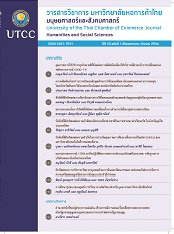The Impact of the TFRS Adoption on Predictive Ability for Future Cash Flows: Evidence from Listed Companies in Thailand
Main Article Content
Abstract
The purpose of this research is to investigate the interaction effect of Thai Financial Reporting Standards (TFRS) adoption by Thai listed companies on predictive ability for future cash flows. The sample group is comprised of companies listed in the Stock Exchange of Thailand, and there are 4,226 samples from 2005 to 2016. Multiple regression analysis is employed to test hypotheses.
The overall research results show that net income, cash flow from operations, and total accruals have the predictive ability for future cash flows. In addition, considering the period 2011 to 2016, which is the TFRS adoption period for Thai listed companies, the results indicate that TFRS has statistically positive interaction effects on net income, cash flow from operations, and total accruals in predicting future cash flows. Therefore, adopting TFRS, which is aligned with International Financial Reporting Standards, increases the predictive ability of accounting data for future cash flows. This research provides additional literature on the benefits of TFRS in future cash flow forecasts in the context of the economic environment in Thailand, which is an emerging market country.
Article Details

This work is licensed under a Creative Commons Attribution-NonCommercial-NoDerivatives 4.0 International License.
ลิขสิทธิ์ของบทความ
ผลงานที่ได้รับการตีพิมพ์ถือเป็นลิขสิทธิ์ของมหาวิทยาลัยหอการค้าไทย ห้ามมิให้นำเนื้อหา ทัศนะ หรือข้อคิดเห็นใด ๆ ของผลงานไปทำซ้ำ ดัดแปลง หรือเผยแพร่ ไม่ว่าทั้งหมดหรือบางส่วนโดยไม่ได้รับอนุญาตเป็นลายลักษณ์อักษรจากมหาวิทยาลัยหอการค้าไทยก่อน
References
กุสุมา ดำพิทักษ์, และพนารัตน์ ปานมณี. (2560). ความสามารถพยากรณ์ของข้อมูลผลการดำเนินงานในอดีตในการพยากรณ์กำไรใน อนาคต. วารสารพัฒนบริหารศาสตร์, 57(3), 77-99.
นันทินี ธีรมงคล, และสมชาย สุภัทรกุล. (2565). ความคงอยู่ในกำไรอนาคตและความสัมพันธ์กับราคาหลักทรัพย์ของกระแสเงินสดจากการ ดำเนินงานและหนี้สงสัยจะสูญจากเงินให้สินเชื่อของธนาคารพาณิชย์ในประเทศไทย. วารสารวิชาชีพบัญชี, 18(57), 5-24.
วิไลพร ไพศาล, ภัทราภรณ์ บุตะเขียว, สุรชัย จันทร์จรัส, และนงค์นิตย์ จันทร์จรัส. (2562). การทำนายกระแสเงินสดในอนาคตโดยใช้กำไรสุทธิ กระแสเงินสดจากกิจกรรมดำเนินงาน และรายการคงค้าง. วารสารวิชาการ มหาวิทยาลัยหอการค้าไทย มนุษยศาสตร์และสังคมศาสตร์, 39(3), 20-42. สืบค้นจาก https://utcc2.utcc.ac.th/utccjournal/393/20_42.pdf
สภาวิชาชีพบัญชี ในพระบรมราชูปถัมภ์. (2549). รายงานประจำปี พ.ศ. 2548-2549. สืบค้นจาก https://eservice.tfac.or.th/files/annual_report/รายงานประจำปี%202548%20-%202549.pdf
สภาวิชาชีพบัญชี ในพระบรมราชูปถัมภ์. (2563). กรอบแนวคิดสำหรับการรายงานทางการเงิน. สืบค้นจาก https://www.ratchakitcha.soc.go.th/DATA/PDF/2563/E/271/T_0014.PDF
Al-Dhamari, R. A., & Ismail, K. N. I. K. (2014). An investigation into the effect of surplus free cash flow, corporate governance and firm size on earnings predictability. International Journal of Accounting and Information Management, 22(2), 118-133.
Atqa, A. A., Lee, K. H., & Mohd-Saleh, N. (2019). Has IFRSs improves predictions of future cash flows? Evidence from Malaysia. International Journal of Business and Society, 20(2), 851-869.
Atwood, T. J., Drake, M. S., Myers, J. N., & Myers, L. A. (2011). Do earnings reported under IFRS tell us more about future earnings and cash flows? Journal of Accounting and Public Policy, 30(2), 103–121.
Ball, R. (2016). IFRS–10 years later. Accounting and Business Research, 46(5), 545-571.
Ball, R., Robin, A., & Wu, J. S. (2003). Incentives versus standards: Properties of accounting income in four East Asian countries. Journal of Accounting and Economics, 36(1–3), 235-270.
Barth, M. E., Cram, D. P., & Nelson, K. K. (2001). Accruals and the prediction of future cash flows. The Accounting Review, 76(1), 27-58.
Barth, M., Landsman, W., Lang, M., & Williams, C. (2012). Are international accounting standards-based and US GAAP-based accounting amounts comparable. Journal of Accounting and Economics, 54(1), 68–93.
Chotkunakitti, P. (2005). Cash flows and accrual accounting in predicting future cash flows of Thai listed companies (Doctoral dissertation, Southern Cross University). Retrieved from https://researchportal.scu.edu.au/esploro/outputs/doctoral/Cash-flows-and-accrual-accounting-in/991012822060702368
El‐Sayed Ebaid, I. (2011). Accruals and the prediction of future cash flows: Empirical evidence from an emerging market. Management Research Review, 34(7), 838-853.
Jensen, M. C., & Meckling, W. H. (1976). Theory of the firm: Managerial behavior, agency costs and ownership structure. Journal Financial Economics, 3(4), 305-360.
Judge, W., Li, S., & Pinsker, R. (2010). National adoption of international accounting standards: An institutional perspective. Corporate Governance: An International Review, 18(3), 161-174.
Kouki, A. (2018). IFRS and value relevance: A comparison approach before and after IFRS conversion in the European countries. Journal of Applied Accounting Research, 19(1), 60-80.
Lee, T. A., Ingram, R. W., & Howard, T. P. (1999). The difference between earnings and operating cash flow as an indicator of financial reporting fraud. Contemporary Accounting Research, 16(4), 749-786.
Li, S., Sougiannis, T., & Wang, S. (2017). Mandatory IFRS adoption and the usefulness of accounting information in predicting future earnings and cash flows. SSRN Electronic Journal, doi:/10.2139/ssrn.2948775.
Marzuki, M. M., & Wahab, E. A. A. (2018). International financial reporting standards and conservatism in the Association of Southeast Asian Nations countries: Evidence from Jurisdiction Corruption Index. Asian Review of Accounting, 26(4), 487-510.
Mohd, M., Mohamed, K., Daher, A., & Hasnan, S. (2022). Historical earnings, accrual accounting, and future cash flows: A Malaysian Perspective. The Economics and Finance Letters, 9(2), 125-138.
Nallareddy, S., Sethuraman, M., & Venkatachalam, M. (2020). Changes in accrual properties and operating environment: Implications for cash flow predictability. Journal of Accounting and Economics, 69(2-3). doi: 10.1016/j.jacceco.2020.101313.
Odoemelam, N., Okafor, R. G., & Ofoegbu, N. G. (2019). Effect of international financial reporting standard (IFRS) adoption on earnings value relevance of quoted Nigerian firms. Cogent Business & Management, 6(1). doi: 10.1080/23311975.2019.1643520.
Palea, V., & Scagnelli, S. D. (2017). Earnings reported under IFRS improve the prediction of future cash flows? Evidence from European banks. Australian Accounting Review, 27(2), 129-145.
Samaha, K., & Khlif, H. (2016). Adoption of and compliance with IFRS in developing countries: A synthesis of theories and directions for future research. Journal of Accounting in Emerging Economies, 6(1), 33-49.
Sloan, R. G. (1996). Do stock prices fully reflect information in accruals and cash flows about future earnings? The Accounting Review, 71(3), 289–315.
Tangruenrat, C., & Yomchinda, N. (2022). IFRS adoption and the value relevance: Evidence from the stock exchange of Thailand. Journal of Federation of Accounting Professions, 4(10), 66-80.
Vivattanachang, D. & Supattarakul, S. (2013). The earnings persistence and the market pricing of earnings and their cash flow and accrual components of Thai firms. Journal of Accounting Professions, 9(25), 63–79.
Waldron, M. A., & Jordan, C. E. (2010). The comparative predictive abilities of accrual earnings and cash flows in periods of economic turbulence: The case of the IT bubble. Journal of Applied Business Research, 26(1).85-98.
Wijayana, S., & Gray, S. J. (2019). Institutional factors and earnings management in the Asia-Pacific: is IFRS adoption making a difference? Management International Review, 59(2), 307-334


